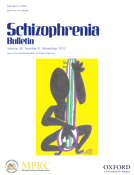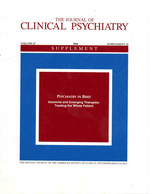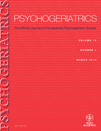
SCHIZOPHRENIA BULLETIN
Scope & Guideline
Pioneering research for better psychiatric outcomes.
Introduction
Aims and Scopes
- Neurobiological Mechanisms:
Research exploring the underlying neurobiological mechanisms of schizophrenia, including genetics, neuroimaging, and molecular biology, to better understand the pathophysiology of the disorder. - Psychological and Cognitive Aspects:
Studies examining cognitive deficits, emotional regulation, and psychosocial factors that contribute to the experience of schizophrenia, emphasizing the interplay between mental processes and symptoms. - Treatment and Intervention Strategies:
Investigations into pharmacological and non-pharmacological interventions, including cognitive remediation, psychosocial therapies, and innovative treatment approaches such as digital health interventions. - Epidemiological and Public Health Perspectives:
Research addressing epidemiology, risk factors, and health disparities related to schizophrenia, focusing on societal impacts and the effectiveness of public health strategies. - Transdiagnostic Approaches:
Explorations of concepts that span various psychiatric disorders, including the study of psychosis risk and shared mechanisms with other mental health conditions.
Trending and Emerging
- Digital Health Interventions:
A growing number of studies explore the efficacy of digital health technologies, such as teletherapy and mobile health applications, highlighting their potential to improve access to care and patient outcomes. - Transdiagnostic Research:
An increase in research that examines psychosis across various diagnostic categories, emphasizing shared mechanisms and risk factors, reflecting a move towards understanding mental health in a more integrated manner. - Cognitive Remediation and Functionality:
There is a notable rise in studies investigating cognitive remediation strategies aimed at improving functional outcomes in individuals with schizophrenia, indicating a shift towards enhancing quality of life. - Social and Environmental Factors:
Emerging research emphasizes the role of social determinants, such as socioeconomic status and childhood adversity, in the onset and progression of schizophrenia, underscoring the need for a holistic understanding of the disorder. - Machine Learning and AI in Psychiatry:
The application of machine learning and artificial intelligence to predict treatment responses, identify biomarkers, and enhance diagnostic accuracy is on the rise, indicating a trend towards incorporating advanced technology in psychiatric research.
Declining or Waning
- Historical Perspectives on Antipsychotic Medications:
Although historical analyses of antipsychotic medications have been foundational, recent publications indicate a shift towards contemporary research focusing on innovative interventions and current treatment paradigms. - Single-Disease Focus:
There seems to be a waning emphasis on studies that exclusively examine schizophrenia without considering comorbid conditions or broader psychiatric contexts, reflecting a trend towards more integrated approaches. - Basic Science Studies:
The volume of purely basic science studies, such as animal models without translational implications, appears to be decreasing, as the journal increasingly prioritizes research with direct clinical relevance.
Similar Journals

JOURNAL OF CLINICAL PSYCHIATRY
Transforming clinical psychiatry with evidence-based insights.The JOURNAL OF CLINICAL PSYCHIATRY is a premier publication dedicated to advancing the understanding and treatment of psychiatric disorders. Established in 1978 and published by Physicians Postgraduate Press, this esteemed journal provides a vital platform for researchers, clinicians, and mental health professionals to share innovative findings and evidence-based practices in psychiatry. With an impressive impact factor and recognized as a Q1 journal in both Medicine (miscellaneous) and Psychiatry and Mental Health, the journal ranks among the top in its field, sitting at 96th out of 567 in Scopus rankings, placing it in the 83rd percentile. The journal's commitment to high-quality, peer-reviewed articles facilitates the dissemination of knowledge crucial for advancing clinical practices and improving patient outcomes. Access to its latest research is offered through institutional subscriptions, making it an essential resource for anyone involved in the mental health sector, from seasoned practitioners to aspiring students.

EUROPEAN ARCHIVES OF PSYCHIATRY AND CLINICAL NEUROSCIENCE
Advancing the Frontiers of Psychiatry and NeuroscienceEuropean Archives of Psychiatry and Clinical Neuroscience is a prominent peer-reviewed journal published by Springer Heidelberg, focusing on the interdisciplinary aspects of psychiatry and clinical neuroscience. With an ISSN of 0940-1334 and an E-ISSN of 1433-8491, this journal provides a rigorous platform for innovative research spanning biological psychiatry, pharmacology, and various aspects of mental health. The journal boasts a distinguished impact factor that places it in the Q2 category for Biological Psychiatry and Q1 in both Medicine (miscellaneous) and Psychiatry and Mental Health as of 2023, reflecting its significant contribution to the field. Additionally, its Scopus rankings highlight its esteemed position among the top journals, particularly in Medicine and Neuroscience disciplines. Readers can access a wealth of valuable research articles, case studies, and reviews, crucial for advancing understanding and treatment within these vital fields. Initially converged in 1990, the journal continues to evolve and support scholarly dialogue until 2024 and beyond, making it an essential resource for researchers, clinicians, and students alike.

JAMA Psychiatry
Empowering Minds with Groundbreaking Psychiatric InsightsJAMA Psychiatry, published by the American Medical Association, stands as a leading peer-reviewed journal in the fields of psychiatry and mental health, featuring an impressive impact factor that reflects its significance in advancing research and clinical practice. With an ISSN of 2168-622X and an E-ISSN of 2168-6238, this journal operates on a comprehensive access model that allows for the dissemination of vital research findings to a global audience. Since its inception in 2013, JAMA Psychiatry has consistently ranked in the top quartile (Q1) in both the Medicine (miscellaneous) and Psychiatry and Mental Health categories, with a remarkable Scopus rank of #4 out of 567, placing it in the 99th percentile. Addressed from its headquarters in Chicago, Illinois, the journal's objectives encompass the publication of original clinical research, innovative treatment strategies, and insightful reviews that enrich the understanding of psychiatric disorders. By bridging the gap between research and real-world application, JAMA Psychiatry remains an essential resource for researchers, clinicians, and students dedicated to improving mental health outcomes.

WORLD JOURNAL OF BIOLOGICAL PSYCHIATRY
Bridging Biological Insights and Psychiatric Care.WORLD JOURNAL OF BIOLOGICAL PSYCHIATRY, a premier academic journal published by TAYLOR & FRANCIS LTD, stands at the forefront of interdisciplinary research in the fields of Biological Psychiatry, Psychiatry, and Mental Health. Based in the United Kingdom, this esteemed journal (ISSN: 1562-2975; E-ISSN: 1814-1412) has become increasingly influential since its inception in 2000, with a remarkable impact factor that reflects its high-quality research contributions. The journal is consistently ranked in the Q1 and Q2 categories across various relevant indices, demonstrating its reputation for excellence within the academic community. With Scopus rankings placing it in the top 20th percentile for Psychiatry and Mental Health, the WORLD JOURNAL OF BIOLOGICAL PSYCHIATRY serves as a vital resource for researchers, professionals, and students seeking to further their understanding of the intricate relationship between biological processes and psychiatric phenomena. Despite being a traditional access journal, it possesses a robust scope that encompasses groundbreaking studies, reviews, and advancements in the understanding of mental health disorders, underlining its importance as a key reference in the advancement of psychiatric science and therapeutic practices.

CURRENT OPINION IN PSYCHIATRY
Transforming Research into Clinical ExcellenceCurrent Opinion in Psychiatry is a premier journal published by Lippincott Williams & Wilkins, dedicated to the dynamic and evolving field of psychiatry and mental health. With a commendable impact factor and ranking 30th out of 567 in the Scopus database, this journal occupies a Q1 quartile position, reflecting its significance and influence within the academic community. Since its inception in 1988, Current Opinion in Psychiatry has aimed to provide critical reviews, leading research, and expert opinions that shape clinical practice and decision-making in psychiatry. While the journal is not open access, it continues to serve as an essential resource for researchers, clinicians, and students seeking insights into contemporary psychiatric challenges and advancements. With its ongoing commitment to high-quality content, the journal remains a vital platform for knowledge dissemination and dialog in the field.

Psychogeriatrics
Bridging gaps in geriatric psychiatry knowledge.Psychogeriatrics is a leading peer-reviewed journal published by WILEY, dedicated to advancing the understanding of mental health and geriatric psychiatry. With an ISSN of 1346-3500 and an E-ISSN of 1479-8301, this journal has been integral to the field since its inception in 2005 and continues to publish cutting-edge research until 2024. Recognized for its impact, Psychogeriatrics holds a commendable Q2 quartile ranking in Geriatrics and Gerontology, Gerontology, and Psychiatry and Mental Health as of 2023. The journal's Scopus rankings reflect its significant contribution to Nursing Gerontology, Medicine Psychiatry and Mental Health, and Medicine Geriatrics and Gerontology. Although it operates with no open access options, Psychogeriatrics remains a vital resource for researchers, professionals, and students who are exploring the complexities of mental health in older populations. The journal not only disseminates innovative research but also tackles pressing issues related to the psychological well-being of the elderly, making it essential reading for anyone focused on improving geriatric mental health care.

ACTAS ESPANOLAS DE PSIQUIATRIA
Fostering collaboration in psychiatric research and practice.ACTAS ESPANOLAS DE PSIQUIATRIA, published by the renowned JUAN JOSE LOPEZ-IBOR FOUNDATION, serves as a vital resource in the field of psychiatry and mental health, particularly within the Spanish-speaking academic community. With its ISSN 1139-9287 and E-ISSN 1578-2735, this journal has been a critical platform for disseminating high-quality research since its inception in 1996 and continues to contribute valuable insights until 2024. As a recognized journal in the Q3 category of psychiatry and mental health, it ranks 387 out of 567 in Scopus, placing it within the 31st percentile, thereby indicating a growing influence among its peers. The journal’s open access options enhance its accessibility, encouraging a broader readership to engage with contemporary research issues in mental health. Researchers, professionals, and students alike will find ACTAS ESPANOLAS DE PSIQUIATRIA essential for staying informed on the latest developments and innovations in psychiatric practice and research.

Neuropsychopharmacology Reports
Connecting research to practice in clinical psychology and psychiatry.Neuropsychopharmacology Reports is a leading open-access journal published by WILEY, dedicated to advancing the fields of clinical psychology, pharmacology, psychiatry, and mental health. Established in 2018, the journal aims to disseminate high-quality research findings, critical reviews, and innovative methodologies that elucidate the complexities of neuropsychopharmacology in enhancing mental health outcomes. With an impressive impact indicated by its Q2 rankings in several categories including Clinical Psychology and Pharmacology (medical) as of 2023, Neuropsychopharmacology Reports stands out as a vital resource for researchers, professionals, and students keen on exploring the interplay between pharmacological interventions and psychological well-being. The journal’s open-access nature ensures that critical advancements in this rapidly evolving field are readily available to a global audience, fostering collaboration and discourse among scholars and practitioners alike. Building on its indexed status with Scopus, the journal is positioned as a noteworthy contributor to ongoing discussions and developments in psychiatry and medical pharmacology.

INTERNATIONAL JOURNAL OF GERIATRIC PSYCHIATRY
Elevating standards in geriatric mental health research.International Journal of Geriatric Psychiatry, published by Wiley, stands as a premier journal dedicated to advancing the field of mental health in older adults. With an impressive impact factor reflective of its Q1 categorization in both Geriatrics and Gerontology, as well as Psychiatry and Mental Health, this journal addresses the critical intersection of aging and mental health, providing a platform for impactful research from 1986 through 2024. Researchers and professionals will find the journal invaluable, as it offers comprehensive insights into a range of subjects pertinent to geriatric mental health, with its ranking in Scopus highlighting its academic rigor and relevance (Rank #147/567 in Psychiatry and Mental Health; Rank #37/116 in Geriatrics and Gerontology). Though it operates on a traditional subscription model, the journal's significant contributions to the understanding of psychiatric disorders in the elderly make it a key resource for anyone involved in geriatric care and research.

PSYCHIATRY AND CLINICAL NEUROSCIENCES
Pioneering Insights in Psychiatry and Clinical NeurosciencesPSYCHIATRY AND CLINICAL NEUROSCIENCES is a leading journal in the fields of psychiatry and clinical neurology, published by Wiley. With a commendable impact factor and a position within the prestigious Q1 quartile across multiple relevant categories—including Medicine (Miscellaneous), Neurology, and Psychiatry and Mental Health—this journal stands out for its rigorous peer-reviewed content that addresses critical issues in mental health and neurological disorders. Established in 1933, the journal has a rich history of contributing impactful research that guides both clinical practice and academic inquiry. Although it is not an open-access journal, its high relevance is underscored by its Scopus rankings, with notable percentiles in Psychiatry and Neurology, making it a vital resource for researchers, clinicians, and students looking to stay abreast of the latest advancements. Located in the United Kingdom, PSYCHIATRY AND CLINICAL NEUROSCIENCES aims to bridge the gap between theory and practical application, fostering a comprehensive understanding of the complex interplay between mental health and neurological conditions.